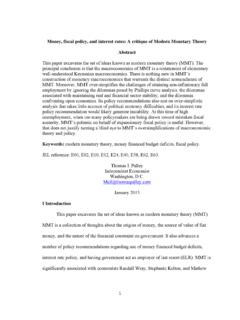Transcription of Anti-Money Laundering Transcript - Login
1 Anti-Money Laundering 12/19/2016 Anti-Money Laundering Transcript Introduction Welcome to the Nationwide Life Companies Anti-Money Laundering course. Click next to begin. Have you ever thought about what it would look like if Nationwide did not have a sufficient Anti-Money Laundering Program in place? Nationwide would be at risk for money Laundering and for penalties if AML programs do not meet regulatory standards. Look at this example. This company failed to properly prevent or detect, investigate and report suspicious activity for several years resulting in millions of dollars in fines. Nationwide companies, including its life insurance companies, broker-dealers, investment advisors, mutual funds, and its bank want to do everything they can to prevent all products from being used to launder money or finance terrorism.
2 In the last 40 years, there have been several AML laws to prevent and detect money Laundering in order to protect our financial markets. These regulations include: The bank secrecy act, the money Laundering control act, the USA patriot act and the Intelligence Reform and Terrorism Prevention Act. Click each regulation to learn more. OFAC laws are designed to enforce foreign policy and national security interests by specifically identifying and restricting business with certain countries, persons or entities, such as terrorists, narcotics traffickers, and those involved in the proliferation of weapons of mass destruction. OFAC is a division in the Department of Treasury, that: Applies to all persons and companies, enforces the economic sanctions imposed by the government, and requires that certain transactions are seized and reported to the government OFAC & AML laws are both designed to protect the financial system.
3 They have a similar goal to stop illegal activity, such as terrorist financing and the drug trade and prevent money Laundering . Now that you know what OFAC & AML laws are designed to do, who do you think is Nationwide s best defense against those that use our products or services for these illegal activities? YOU are Nationwide s best defense for identifying illegal activities such as organized crime, drug dealing, terrorism, and other activities where individuals or groups attempt to use our products or services to conceal the activity. Let s get started! Anti-Money Laundering 12/19/2016 What is money Laundering In this lesson, you will learn what money Laundering is, Nationwide s Anti-Money Laundering Program, and finally your role. Let s start by discussing how and why money is laundered.
4 Click next to begin. money Laundering is the process by which people or organizations involved in criminal activity illegally obtain money and transform it into funds that appear legal. money Laundering is a three-step process, each of which takes time. Click each step below to learn more. Placement, the first step of money Laundering , is physically placing illegally obtained money ( dirty money ) into the financial system or retail economy. This is the point at which illegally obtained money is most vulnerable to detection and seizure, which makes this step the most threatening to a money launderer. Layering is the separation of illegally obtained money from its source through a series of complicated financial transactions to make the money appear legitimate, thus making it difficult to trace back to its origin.
5 Integration, the final step of money Laundering , is converting illegally obtained money into an otherwise legitimate form. A money launderer, rather than sitting on cash, is likely to put the funds to work for him/her by way of purchases, such as purchasing additional life insurance or investment products, automobiles, real estate, and other assets. Now that you ve learned the name of each of the money Laundering steps, let s try an activity. Match the scenario step on the left with the definition name on the right. The penalties associated with money Laundering can be severe. money Laundering convictions typically result in a combination of fines, prison, and probation, including: Fines, up to twice the amount of the transaction (capped at $500,000, per violation).
6 Also, there is Seizure and forfeiture of property involved in the transaction. What do you think? If you notice potential suspicious activity, do you have to be certain that criminal actions are taking place before contacting Nationwide AML Compliance? It is imperative that you immediately contact Nationwide AML Compliance when you witness any suspicious activity involving a Nationwide contract or customer. Nationwide will investigate the matter to determine if a suspicious activity report (SAR) needs to be filed with the regulators. This Anti-Money Laundering 12/19/2016 must be done within 30 days of identifying the alleged activity as suspicious. So, what is suspicious activity? It is behavior that is unusual or atypical and may be related to money Laundering or terrorist financing.
7 It is usually from Potential customers, Established customers or agents. In addition, suspicious or unusual activity doesn t mean that a customer is a criminal, it simply means that the transaction must be examined further. For example, if a customer that never had unusual activity before had a document that was questionable, you might not think much of it. However, when several questionable document issues are viewed together, it prompts red flags. The list below are examples of Red Flags. If a customer: Uses unusual or suspicious identification documents Attempts to transact business using a foreign address for either account opening, or deposits/withdrawals Is not concerned about risks, commissions, investment performance or cost for the account Cannot explain the nature of their business or does not have knowledge of the industry Purchases a product that appears outside the customer s normal range of financial wealth or estate planning needs Borrows against the cash surrender value of their permanent life insurance policies, particularly when payments are made to unrelated third parties Expresses concern over strict adherence to Anti-Money Laundering procedures.
8 Or shows unusual interest in Nationwide s AML policies and procedures Has a source of funds that cannot be confirmed/seems questionable and Is potentially the victim of elder abuse or coercion Let s see if you can apply what you just learned. Identify which of the scenarios below are red flags. Select YES or NO next to the scenario to check your answer. What do you think? What is the name of the deliberate effort of an agent or financial institution to avoid or ignore information that could lead to the discovery of unlawful activity? Willful blindness is when an agent knowingly ignores information that could lead to unlawful activity. Agents of financial institutions involved in a money Laundering scandal can be fined individually, and sentenced to a maximum of 20 years in prison for ignoring illegally funded transactions.
9 Anti-Money Laundering 12/19/2016 In addition to activities involving potential money Laundering , you need to be aware of two additional types of suspicious activity: fraud and elder abuse. Click each one to learn more. Fraud is: To gain dishonest advantage by misuse of assets and forgery. Fraud occurs during the application process, in conjunction with a loan or withdrawal requests as well as with a claim such as at death or disability. When you see fraudulent activity or other types of red flags , report the activity to Nationwide s AML Compliance Office. Elder Abuse is: One of the fastest-growing types of fraud, which is to financially mistreat older adults. Nationwide is required to report all suspected cases of Elder Abuse to FinCEN.
10 In addition, as required by particular state regulation, a report may need to be filed with the State Attorney General s Office and/or the State Department of Insurance where the individual resides. Approximately 30 states have passed legislation regarding reporting requirements for Elder Abuse. Even though legislation is in place, elder abuse is not often reported. In fact, 1 in 20 older adults say they have experienced financial mistreatment in the past year. This type of fraud can be divided into three broad categories: Unassociated Individuals can abuse elders by: Grandparent Scams Traveling fraudsters or Telesales and/or threatening phone calls Businesses or professionals can take advantage of elders by: Inappropriate/ fraudulent investments Fraudulent charities Lottery Scams and Cyber fraud/ Identity theft And lastly, Family members or caretakers financially mistreat elders by Abuse of Power of Attorney or Abuse of joint accounts, ATM cards or checks.







